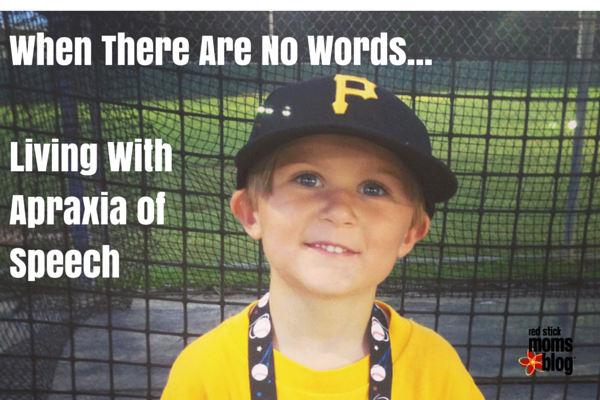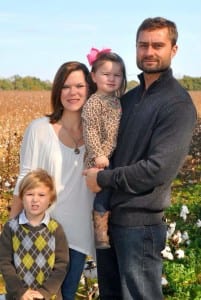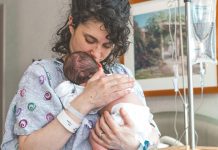We all have fears and worries when it comes to our children. The first several years of my son Baylor’s life was filled with just that… The constant fear of losing him in a store or crowded area. How would I ever find him when he can’t even speak, much less tell someone his name? Or being upset when he has been pumped about Halloween for weeks and weeks but 5 minutes before leaving, your child does a 180 and suddenly doesn’t want to go. After pulling him aside and talking to him, you realize he doesn’t want to go now because he remembers he can’t say “Trick or Treat” like the other children. Imagine looking out your front window, only to see and hear the kid down the street standing in YOUR driveway poking fun at your kid because he talks funny. And your son shies away from the other kids because now he is embarrassed that the bully has made his speech even more obvious. These were just some of my fears and worries that came true because my son has Apraxia of Speech.

So what is Apraxia of Speech? It is a neurological, motor disorder that severely affects speech. Children have great difficulty planning and producing the refined, specific series of movement of the tongue, lips, jaw and palate that are necessary for intelligible speech. In other words, the messages from the brain to the muscles of the mouth gets all jumbled up. There are consistent errors with consonants and vowels and they have inappropriate stress on syllables or words. As of now, there isn’t an accurate known cause and there is no cure. Some kids’ Apraxia resolves with years of intensive speech therapy, whereas others never will.
Baylor was diagnosed at the age of 2. But luckily we noticed something wasn’t right at 15 months old. Baylor started out like any other typical 1 year old saying his first words: “Momma, Dada, bye-bye and duck. Then one day, he never said them again. Just like that, POOF, they were gone. I brought up my concerns to his pediatrician for months but he kept assuring me he was not concerned. My motherly instinct was telling me otherwise and I sought out another opinion with a pediatric neurologist. His neurologist wanted to see him several more times before she diagnosed him and gave us the information for Early Steps, which is a state funded program. Baylor was evaluated by the state and was approved for speech therapy, occupational therapy and special instruction. He qualified for the additional therapies because on top of his speech delay, he also had textural/sensory issues and he also had a hard time chewing, swallowing and spitting out food he did not like.
Even after Baylor was diagnosed, we did not realize how serious this disorder was. His teacher at his Mom’s Day Out program recommended Baton Rouge Speech and Hearing (now Emerge) to us. I called and made the appointment and after speaking with the therapist, it struck me that we were dealing with something more complicated than we ever imagined. At the age of 3, he started seeing an Apraxia specialist several times a week. At this point, he was still only able to grunt and point to tell me what he wanted or needed. He still babbled a lot like a baby and could not form any words. After seeing the therapist for a little over a year, Baylor was finally able to say 1 to 2 words at a time. During this time, he also transitioned from Early Steps into the school system where he was also receiving therapies.
As time went on and the more therapy Baylor received, the better his speech improved. Finally at the age of 4 he was saying 3 – 4 words. We got in contact with Baylor’s previous Early Steps therapist who set us up with one of her S.T.’s that worked privately in our area and was certified in prompting, which is key in treating Apraxia. She has been seeing Baylor privately in our home 2 times a week for over a year and he still receives therapy at school where he is now in Kindergarten.
His private therapist has done a phenomenal job with him and we are so thrilled with his progress. Now at the age of 6, he is almost speaking in complete sentences. Last year was the first time I heard him say “Mommy, I love you” in a complete full sentence. You cannot imagine what that did to my heart after hearing those words. Don’t get me wrong, his speech is still a work in progress. He still leaves off final constants here and there, he struggles with saying his G’s and J’s and he leaves out articles while talking (the, are, is, etc.). I can understand him 100% of the time of course, because I am his Mom. His close friends understand him the majority of the time as well. We are hoping his Apraxia will resolve itself over time, but more than likely it will be something he may have to live with for the rest of his life in some way.
Baylor is a sweet, fun loving, typical 6 year old that enjoys playing outside, playing sports and going to school (most of the time). I no longer have all the worries and fears that once consumed my life and kept me from enjoying my son the way a mother should. My husband and I have learned to take one day at a time and watching the progress Baylor has made, we continue to keep the hope that it will only continue to improve every day. I have to think early intervention played a major role in improving Baylor’s Apraxia. So, I say to all of the mother’s out there: trust your motherly instinct, as you know your child better than anyone. If you or someone you know is worried about their child’s speech, do not hesitate to see a neurologist or speech therapist for a consult. For more information about Apraxia, visit www.apraxia-kids.org.
 Born and raised in Alabama, Alisha and her (then) fiancé Scott, moved to Baton Rouge in 2004. Alisha and her husband Scott are college sweethearts and have been together for over 15 years,married for 10. Right before graduating from OLOL College in 2008 with a BS in Health Service Administration, Alisha found out she was pregnant with their first child. In December 2008, Baylor (now 6) was born. Alisha continued working part time after Baylor came along until October 2012, when their daughter Ella Grace was born (now 3). Between Baylor’s therapies, schooling and having a newborn, Alisha became a full-time stay-at-home mom and has been enjoying it ever since. Besides raising awareness for Childhood Apraxia of Speech, Alisha enjoys reading, crafting, volunteering at Baylor’s school, being outdoors and spending time with her family. Her days now spent home and keeping up with Ella Grace, homework and whatever newest sport Baylor is into.
Born and raised in Alabama, Alisha and her (then) fiancé Scott, moved to Baton Rouge in 2004. Alisha and her husband Scott are college sweethearts and have been together for over 15 years,married for 10. Right before graduating from OLOL College in 2008 with a BS in Health Service Administration, Alisha found out she was pregnant with their first child. In December 2008, Baylor (now 6) was born. Alisha continued working part time after Baylor came along until October 2012, when their daughter Ella Grace was born (now 3). Between Baylor’s therapies, schooling and having a newborn, Alisha became a full-time stay-at-home mom and has been enjoying it ever since. Besides raising awareness for Childhood Apraxia of Speech, Alisha enjoys reading, crafting, volunteering at Baylor’s school, being outdoors and spending time with her family. Her days now spent home and keeping up with Ella Grace, homework and whatever newest sport Baylor is into.



















I feel like you wrote this article about my son Grayson!! I noticed around 18 months that something was wrong and he was no longer talking. I brought it up to our pediatrician and she brushed it off saying “he was just a boy and would grow out of it”. My motherly instincts told me otherwise so we put him in Early Steps. He has been in speech therapy with Early Steps for 10 months now and has made zero progress. We have gotten his hearing checked and an evaluation with a SLP at LSU in New Orleans. Where did you go to get a diagnosis in Baton Rouge? We live in Houma and are struggling to find anyone that will help.
Thank you for this article. Our five year old grandson also suffers with Apraxia of Speech and his story is very similar. He did not attend kindergarten this year, but will go next year. He does therapy twice a week with the school system (he lives outside of Atlanta). He also has a speech pathologist that serves him at home. The casual observer would not recognize a problem. He has progressed so well simply because his parents were proactive. Early intervention is critical.
Your story is so close to my sons. At 2 he was diagnosed and he underwent speech therapy 4xs week plus 2xs week private therapy. At 7 he was well enough the private and school therapists released him! He is 9 and doing well, many times we have to remind him to slow down and think about that he wants to say because he will just blurt out a sentence that even I can’t understand. I also notice when he gets stuck he will repeat the beginning sentence over and over, like a broken record.
I want you to know with persistence and as long as your son is willing to learn then keep pushing. Some moms criticized me for having him in so much therapy. Said I was not allowing him to have fun. What they didn’t understand is my son wanted to learn. He enjoyed therapy because they incorporated play into the sessions.
People that first meet him ask if he has a speech issue because he has a different type of accent. I don’t notice it. I really don’t care as log as he can speak!
Ryan’s biggest word hang up was shoe. Yes, shoe. He kept wanting to say shatoo. To this day I will ask him periodically to say the word just to reassure myself he is ok.
Good job Bayler! Keep going at it!
Oh my this is my boy to a tee! Thanks for sharing!!
Great article. My son is almost four with barely no speech at all. It took us until now to reach out to early intervention and nurologist. We though he was just a boy being a little delayed not to mention we also worried he would be misdiagnosed with something like autism. I don’t feel my son is autistic but rather has Apraxia. He’s very smart but has very little verbal communication. I’m hoping the nurologist appointment goes well. As a mom of 5, 4 being girls and my only son showing such high signs of apraxia I’m flustered with thoughts of how to help him. Hoping we get a correct diagnosis soon.